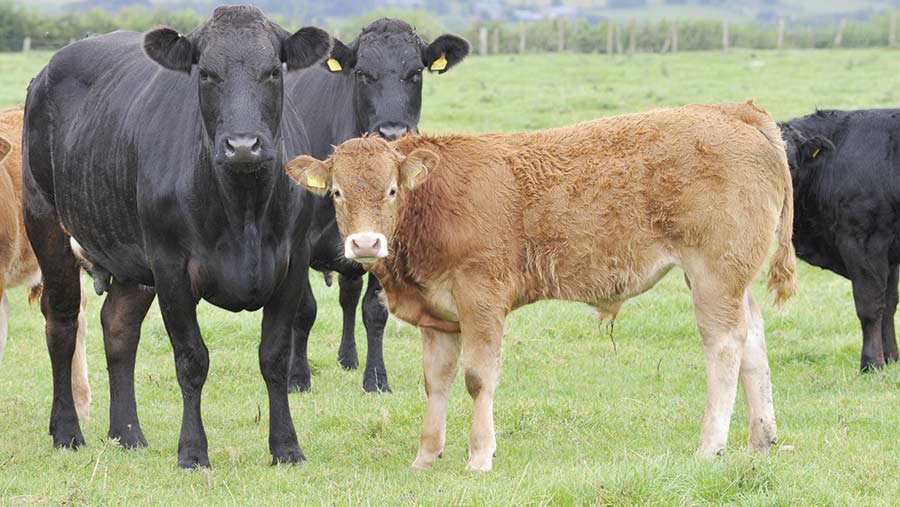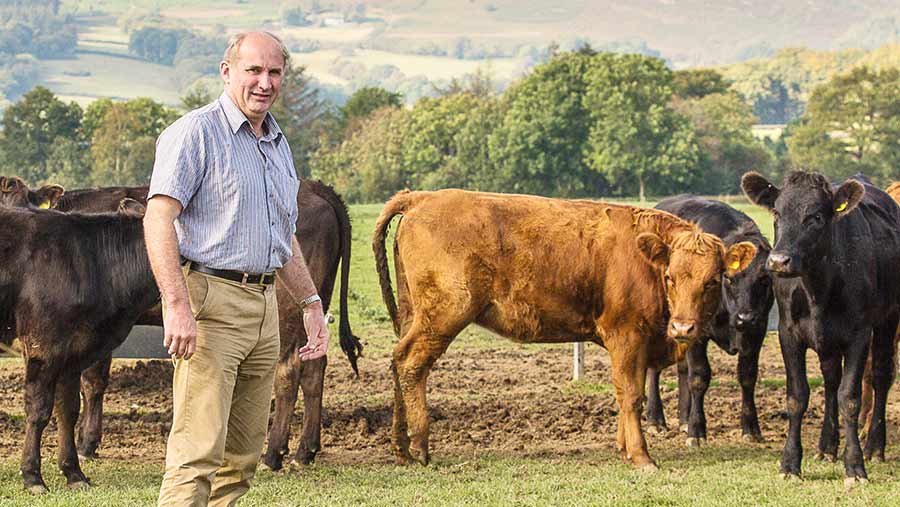How a group of beef farmers took over their supply chain
Collaboration is helping five Welsh beef farmers to secure a bigger share of the market value of their finished cattle.
Three years ago, Robert Lewis got together with four other beef producers to form Cambrian Mountains Beef, establishing it as a Community Interest Company – a special type of limited company that exists to benefit the community rather than private shareholders.
See also: Selecting for feed efficiency could raise beef profits 39%

The group aims to supply two or three carcasses weekly to reduce costs © Debbie James
By marketing their cattle under the umbrella of Cambrian Mountains Beef they can capture a competitive premium, above the benchmark price for graded 4L beef.
“Long gone are the days when farmers could take no interest in marketing their stock and expect to make a profit,” reckons Mr Lewis, who runs a 60-cow single suckle Limousin-cross herd at 260-acre Glanelan Farm, Rhayader.
Royal approval
All five farms are on the upland pastures of the picturesque Cambrian Mountains range, which covers around 10% of Wales and is one of the most sparsely populated areas in England and Wales.
The Prince of Wales, a well-known advocate of local food schemes, was so impressed with the initiative that he offered his support by giving the farmers permission to base their logo on a watercolour he had painted; he also provided some financial support to get it up and running.
Last year Cambrian Mountains Beef generated a turnover of more than £50,000.
“It’s the way forward, adding value to what we produce,” says Mr Lewis, who manages the group’s procurement. “This approach gives us complete control of the short supply chain.”
For commercial reasons, he chose not to disclose the exact price premium, but similar schemes are known to command around 40p/kg above the base price.
How it started
Mr Lewis has sold some heifers to a local butcher for more than 10 years, but was keen to explore additional options for adding value to others.
He did this five years ago, with support from Farming Connect, but the initiative didn’t progress at that point.
But Mr Lewis and four other farmers, who had been involved in that preliminary research, didn’t give up hope of one day taking the idea forward. “It came down to five producers, we stuck together from the start,” he says.
As part of the Cambrian Mountains Initiative, the beef producer group accessed funding from the Welsh Government Rural Development Plan to get the project off the ground.
ADAS was contracted to run the project and to help the group develop a supply chain and identify potential customers.
They visited potential buyers with free samples from cattle they had slaughtered. “It was a bit like being on the BBC show The Apprentice!” Mr Lewis recalls. “We had to get out there and sell.
“We took samples to high-end restaurants; that’s where we wanted to develop our market.”
The legwork paid off and the group secured an order with a London wholesaler to supply one carcass a week.
How it works
A condition of sale, set by the group, was that the customer must buy the whole carcass.
“This keeps costs to a minimum by avoiding an imbalance of carcass, although this presented its own challenges when we were looking for customers as some were only interested if they could have the higher quality cuts, not the cheaper parts,” says Mr Lewis, who also runs a flock of 1,200 Welsh Mountain, Cheviots and Welsh mule ewes.
The group pays an £80 slaughter fee to Llanidloes-based Randall Parker Foods, and the customer pays for the transport cost from the abattoir to the carcass’s destination.
A 5p/kg levy is deducted from the premium to cover the group’s running costs.
Meeting customer demands

Robert Lewis says meeting a customer’s exact requirements is key to successful collaborative sales © greenweeds.com
Mr Lewis says a direct marketing group will only be successful if it meets a customer’s exact requirements fully and consistently.
For Cambrian Mountains Beef, specification has been set for finished cattle within the weight range of between 290 and 400kg, with carcases of E to O+ conformation and between 3 and 4H fat class.
“One of the stipulations of our customer was fat cover, because the carcass is age dried and during the hanging process the fat cover enhances the eating quality,” says Mr Lewis.
Unlike some added-value supermarket beef schemes, Cambrian Beef isn’t confined to one breed type – the group members all have different breeds including Limousin-cross, Hereford, Aberdeen Angus and Saler.
All are backed with PGI Welsh Beef status and Farm Assured membership.
How cattle are finished
Mr Lewis runs his herd on a forage-based system. Cattle are at grass in the summer and on a diet of round bale and clamp silage and home-grown barley in the winter. “We only supplement towards the end of finishing, to get them to target,” he says.
The herd calves in the spring and calves are weaned at between 8 and 10 months old.
All bulls are kept entire and sold to ABP at 380-400kg deadweight. Heifers are finished at 18-24 months, at 340-360kg, after two summers at grass. These are sold through Cambrian Mountains Beef and to Aberystwyth butcher Rob Rattray.
The benefits of collaboration
Mr Lewis suggests there are many benefits of collaborating with other farmers within a formal structure.
“We are a very close-knit group and working together gives each of us a good understanding of the supply chain and what the customer’s requirement is.
“Personally, I have gained a good business knowledge of dealing directly with the customer and how the market works.”
Mr Lewis’s whole family is involved in agriculture – his wife, Audrey, and their sons Gethin, Rhys and Ieuan.
He says one of the reasons he was keen to be part of a local marketing initiative was as much to secure a future for the next generation as his own, together with a passion for providing a quality product and maintaining traditional family farms.
“For all members of the group it is about the next generation, because at the end of the day that generation represents the future of Welsh farming,” he says.
“I wanted to be able to show the boys that farming isn’t just about the more mundane day-to-day aspects of running a farm.”
Time and effort
Mr Lewis believes a weakness in agriculture is that farmers don’t take enough time and effort to understand their business and their markets.
“If we don’t understand what happens to our animals after they leave the farm how can we expect to progress our businesses?”
The next step for Cambrian Mountains Beef is to develop its customer base.
“If we could supply two or three carcasses a week it would help to reduce our costs,” says Mr Lewis.
The group recently secured funding from the Welsh Government Rural Communities – Rural Development Programme 2014–2020.
The scheme they have accessed is the European Innovation Partnership in Wales and the funding is aimed at improving their skills to expand their supply base.
“It has taken a long time to get to where we are and we want to build on what we have achieved, by getting a better knowledge of the supply chain,” says Mr Lewis.
“We feel there is a market out there for a dedicated product with excellent eating quality and produced from a traditional upland area. We have set our sights on meeting that demand.”
Considering establishing a marketing group? Robert Lewis has these tips:
- Be patient – the process can be very slow
- The product must be the right match for the customer’s needs
- Don’t forget there are many government-backed funding sources to get these initiatives off the ground
The other farmers behind Cambrian Mountains Beef
Vincent and Marion Jones, who farm at Bryn-yr-hesglwyn Farm, Llanidloes, with sons James and Aneurin. They have 60 pure Salers.
Robert and Fiona Jenkins and son, Edward, farm at Cilhaul, near Trefeglwys, Powys. Their 120 suckler cows produce mainly Hereford cross beef.
Alun and Aneurin Williams and their father farm at Upper Bwlchyllyn Farm, Trefeglwys, running 65 mostly Angus and Limousin cross suckler cows.
Andrew Evans, Dol-Llys Farm, Llanidloes, Powys, who with his wife, Janet, and son, Richard, run a herd of 70 suckler cows including 30 pure Herefords.
